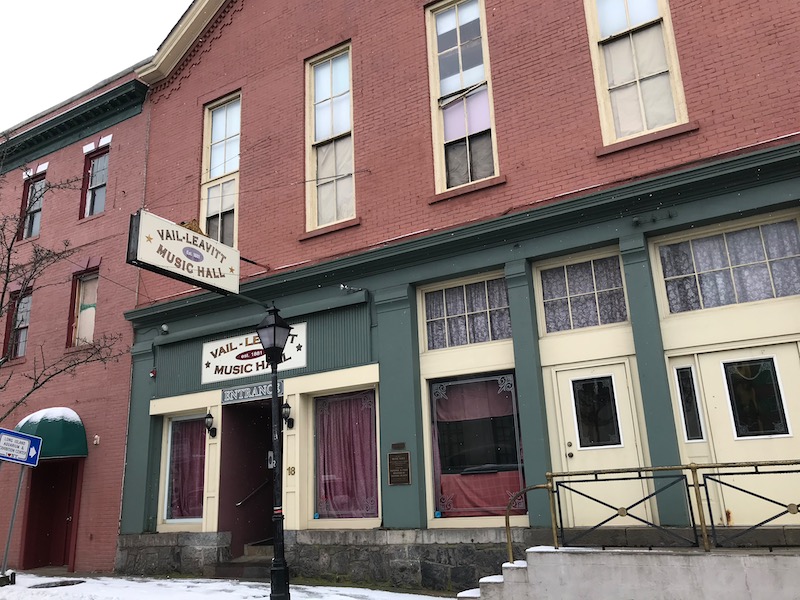
Riverhead Town has apparently prevailed in its effort to recover ownership of the Vail-Leavitt Music Hall.
The board of directors of the Council for the Vail-Leavitt Music Hall, the nonprofit that owns the historic theater, last week voted to “relinquish itself and the real property to the Town in settlement of all issues,” according to minutes of the board’s October 2 meeting.
In a letter to the town, hand-delivered by the Council for Vail-Leavitt President William Miller on Friday, the organization advised the town it will not defend a lawsuit brought by the town in August to recover title to the property.
“Instead, the Council has decided to cede the matter to the Town,” Miller wrote.
Miller also delivered corporate resolutions, the keys to the building and the council’s corporate seal and other documents to the town.
The five members of the Vail’s board of directors resigned effective October 6.
The move took town officials by surprise.
Town Attorney Erik Howard said in a phone interview last week that he was still reviewing the documents Miller delivered to the town and would meet with the Town Board to discuss next steps. The matter was dicussed last week by the Town Board in executive session at a work session.
Copies of the documents delivered to the town were provided to RiverheadLOCAL by Miller on October 6.
Among the documents in the package delivered to the town were two promissory notes.
Both promissory notes were executed by the treasurer of the Vail-Leavitt board on October 5.
Resolutions authorizing the treasurer to execute both promissory notes were approved by the Vail-Leavitt board on October 6, the day after the notes were executed.
One note promises to pay Riverhead architect Geoffrey Freeman $30,750 on or before December 31, plus interest at 5.5 percent, from October 5 to December 31. The note represents sums due to Freeman for architectural services, advice and assistance, rendered to the Council for the Vail-Leavitt since 2018, according to the October 5 resolution authorizing the note.
The second note promises to pay Vail-Leavitt board member Bob Barta, a longtime member and past president of the board, the sum of $9,517, plus interest at 5.5 percent, from October 5 to December 31. The amount owed Barta is for “substantial sums advanced as loans” from Barta since 2018 to support the daily operations of the Vail-Leavitt, according to the resolution authorizing the note.
The resolution authorizing the note to Barta refers to a prior note it states was executed by the Council to Barta on June 28, 2012, which remains outstanding and unpaid. It does not state the amount outstanding, nor does it recite the terms of the 2012 note. The resolution states that the new note authorized on October 6 is in addition to the 2012 note, but includes “in part” interest due on the 2012 note “as of June 28, 2012.”
Another action taken by the board at its final meeting on October 6 was authorizing the council to assume the obligations of an August 2 written agreement entered into by the board president on behalf of the council with the Digital Resource Group LLC for services in connection with social media, publicity, ticket sales and website. The resolution does not state terms of the agreement, a copy of which was not provided to RiverheadLOCAL.
“I don’t think we’re going to discontinue the case right away,” Howard said yesterday. “These promissory notes and some other stipulations they signed earlier in the case may give rise to some additional litigation that they may not be expecting,” he said.
Howard noted that the two promissory notes were executed prior to the resolutions authorizing the treasurer to execute them. As a result, there may be a question of whether they are valid obligations of the corporate entity, he said.
As for how the town will proceed with operation of the theater, Howard said “the first order of business would be there would have to be new members to the council” and there would have to be a meeting, in accordance with the bylaws.
“I still have to sit and talk to the Town Board about all this and sort out the options,” Howard said.
Riverhad Town in 1980 obtained federal grant funding to purchase the then century-old building that housed an upstairs opera house. The opera house had not been operated as a theater for many years — having had stints that included a roller rink, a gambling parlor and a Chinese restaurant, according to a 1981 Newsday article. It was described as “a shambles” by a local businessman who was a founder of the Council for the Vail-Leavitt Music Hall, Harold Smith.
The town conveyed title to the Council for the Vail-Leavitt Music Hall in March 1982, according to town records. The deed has a provision known as a “reverter clause,” which allows the town to recover the property if it is not used for the purposes for which it was conveyed. According to a resolution adopted by the Town Board in May, those purposes were “educational, recreational and/or any other cultural purpose.” The reverter clause also allows the town to recover title “in the event that the historical character of the property was not properly maintained.”
The town filed a lawsuit against the Council for the Vail-Leavitt Music Hall in August, seeking a court order granting title to the town under the deed’s reverter clause. The town argued that the Council for the Vail-Leavitt has not fulfilled its obligations to maintain, manage and operate the property as required by the terms of the conveyance.
According to town officials, the council did not properly maintain the property, which had become dilapidated and is in dire need of urgent, and expensive, repairs.
This article originally appeared on RiverheadLOCAL, and is reprinted here with permission — Ed.